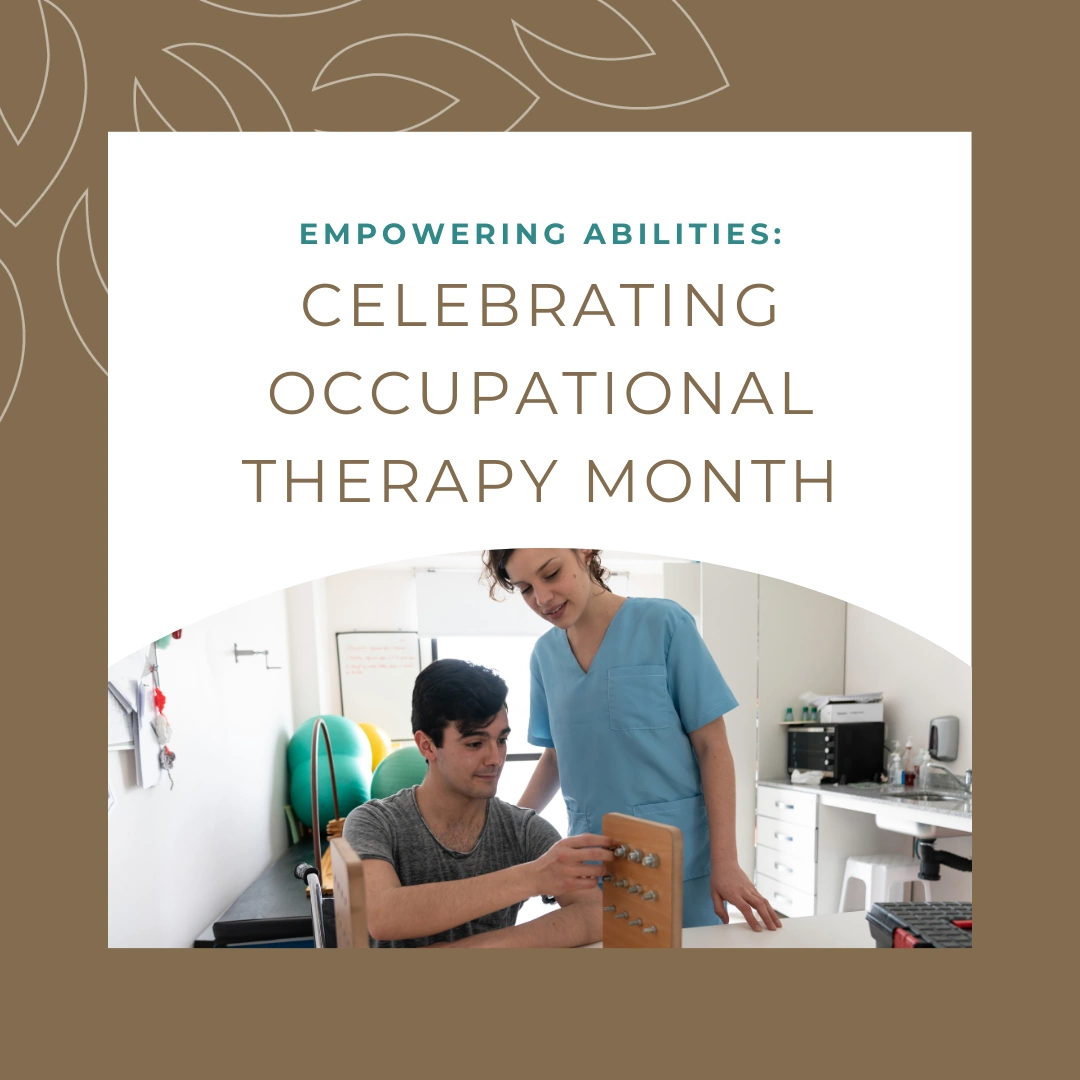Empowering Abilities: Celebrating Occupational Therapy Month at Flatrock

April is Occupational Therapy Month, a time to recognize and celebrate the incredible work of occupational therapists within the healthcare industry. These professionals play a vital role in helping individuals of all ages gain greater independence, build critical life skills and thrive in their daily routines – especially those with intellectual and developmental disabilities, who often benefit from personalized, relationship-driven support.
Occupational therapists are experts in adapting everyday tasks to meet the unique needs of the individuals they serve. From developing motor coordination to improving sensory processing, supporting emotional regulation and more, these professionals bring a creative and compassionate lens to every challenge. While the work can often be demanding, it’s also deeply rewarding, rooted in small wins that lead to meaningful breakthroughs.
At Flatrock, we’re proud to celebrate the life-changing impact of occupational therapy and the dedicated professionals who deliver it. In honor of Occupational Therapy Month, we’re highlighting the empowering profession and sharing a few stories from our team that bring this mission to life.
What Occupational Therapists Do, and Why It Matters
At its core, occupational therapy is all about enabling people to participate in the activities of everyday life. For disabled individuals, this could include helping them learn to dress independently, regulate their emotions, communicate more effectively or build confidence in navigating daily routines.
Whether working in schools, clinics, homes or community settings, occupational therapists tailor their approach to the unique goals and abilities of each person. Techniques might include task-based interventions, sensory integration, the Zones of Regulation framework or behavior support – all with a focus on what the individual can do and how to build from there.
“Occupational therapy values independence, but we also value our residents’ quality of life,” said Ariel, an occupational therapist at Flatrock. “In this setting, we have many residents who require support to participate in sensory activities to regulate their nervous system so that they can perform at their highest level of functioning.”
For many professionals, the draw to the field comes from a desire to make a tangible difference in people’s lives through small, everyday moments that add up to big changes. Tori, another occupational therapist at Flatrock, said: “When you work with this population, finding someone’s motivation is important. We focus on the skills they have now and build on them. Our focus is ‘what can they do?’ not ‘what can’t they do?’ and that makes a big difference in helping our residents see themselves in a positive light.”
Progress in Practice: Small Wins with Big Impact
Occupational therapy is rarely linear. It’s a process of building trust, adapting to individual needs and celebrating meaningful progress, however that may look. Creativity and flexibility are essential tools for a professional in this field, allowing them to meet individuals where they are and find personalized paths forward, even when the route isn’t obvious. This constant problem-solving is part of what makes the profession challenging and inspiring.
One example: a Flatrock therapist supporting a resident while participating in pool time. While he loved the water, it was difficult for him to leave the pool. The first visit took 40 minutes, plenty of creative thinking and a lot of patience to help him leave the water safely and calmly. But the next time? That same transition took just five minutes. “Seeing so much success in such little time was so rewarding as a clinician and I love that I got to support him to participate in an occupation that was meaningful to him.”
In another instance, one Flatrock resident had a strong sensitivity to light touch and often responded to others’ proximity with defensive behaviors – a response that likely stemmed from past interactions that felt overwhelming or unpredictable. But over time, through patience and consistency, their occupational therapist worked to build a relationship grounded in understanding and respect. “While interacting with them a few weeks ago, they asked for a hug. This was such a big deal for them and I felt so honored that they trusted me enough for something like that.”
These types of outcomes are common in occupational therapy, and while they may not always be headline-grabbing, they’re life-changing for the individuals and families involved. They show what’s possible when care is personal, patient and rooted in a deep understanding of each person’s potential.
Encouraging Growth at Home and in the Community
Occupational therapists often work closely with families and caregivers, offering strategies and encouragement to support continued progress beyond therapy sessions. They focus on building consistency and confidence for the individual and their support network.
One simple but powerful piece of advice from Ariel: “Think, FUNctional. Make what you can as fun as you can and integrate the techniques as functionally as you can into your everyday life and routine.” Turn tasks like brushing teeth, dressing and meal prep into collaborative, enjoyable moments.
Most importantly, allow room for mistakes. What works one day may need to be reimagined the next depending on energy levels, behavior or emotional needs. Independence is built through trial and practice, not perfection. “Mistakes are ok! They help us learn where we have room to grow,” said Tori. “When your loved one is working on learning a new skill, let them make mistakes, give them extra time and give them encouragement.”
Occupational therapy offers a meaningful career path for those who want to make a real, lasting difference in the lives of those who need compassion and support. Whether you’re a student exploring options or a healthcare professional looking for a new path, occupational therapy combines science, creativity and compassion in a way that few fields can.
Flatrock offers opportunities in a wide range of roles that support adults with intellectual and developmental disabilities. We’re always looking for passionate people ready to grow with us. Explore our open positions at flatrockinc.org/careers and follow us on LinkedIn to learn more about our mission.
